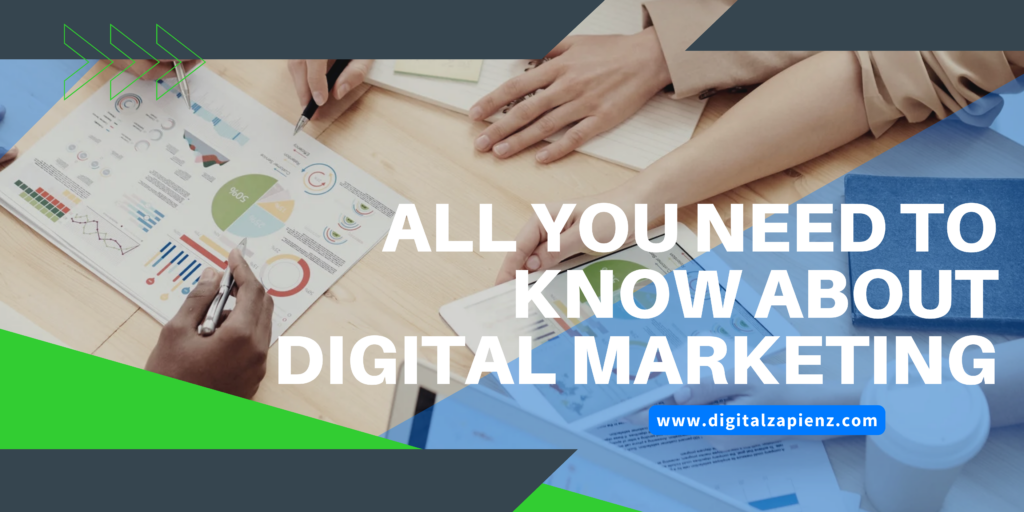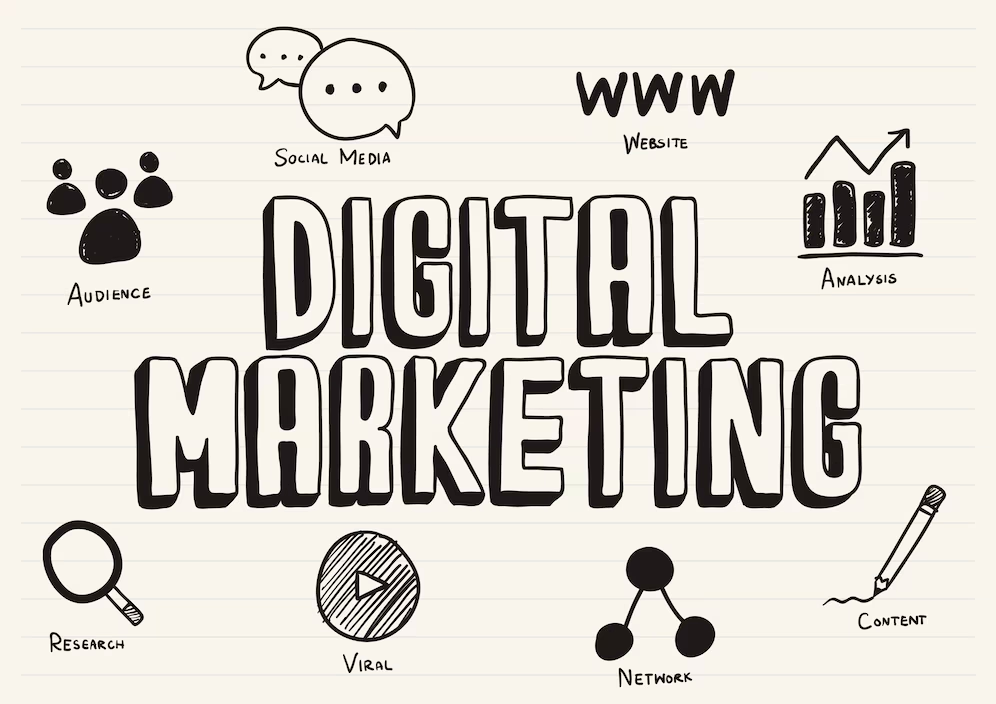
All You Need to Know About Digital Marketing
Introduction to Digital Marketing
All you need to know about digital marketing begins with understanding its essence and pivotal role in the contemporary business environment. Unlike traditional marketing, which primarily relies on print, TV, radio, and direct mail, digital marketing harnesses the potential of the internet and other digital mediums to reach a broader audience. Businesses are increasingly gravitating towards digital channels due to their expansive reach, cost-effectiveness, and real-time analytics, which are instrumental in crafting more targeted and adaptable marketing strategies.
The history of digital marketing dates back to the 1990s when the advent of the internet transformed the landscape of marketing. The introduction of search engines, particularly the launch of Google in 1998, marked a significant milestone in the domain. The subsequent rise of social media platforms like Facebook, Twitter, and Instagram in the 2000s further revolutionized how brands engage with their audience, fostering direct interactions and community building. Moreover, the advent of mobile marketing, driven by the proliferation of smartphones, has enabled marketers to reach consumers on the go, creating omnipresent promotional opportunities.
Through its evolution, digital marketing has consistently aimed to achieve a few fundamental goals. Primarily, it seeks to enhance brand awareness, ensuring that a wide audience recognizes and remembers the brand. Lead generation emerges as another crucial objective, where digital marketing strategies like email campaigns, content marketing, and optimized landing pages are employed to attract and convert potential customers. Additionally, customer retention is a key focus area, with strategies such as personalized email updates, social media interaction, and loyalty programs designed to maintain ongoing engagement and foster long-term relationships with customers.
In essence, digital marketing is an ever-evolving field that capitalizes on technological advancements to create more dynamic and interactive marketing experiences. Grasping all you need to know about digital marketing is vital for businesses aiming to stay competitive in today’s fast-paced digital era.
Key Components of Digital Marketing

In the ever-evolving realm of digital marketing, understanding the key components is fundamental to crafting an effective strategy. These elements work in tandem to generate a robust online presence and drive business success. Among the most critical components are Search Engine Optimization (SEO), Content Marketing, Social Media Marketing, Email Marketing, Pay-Per-Click (PPC) Advertising, and Affiliate Marketing. Let’s explore each of these in detail.
Search Engine Optimization (SEO): SEO is the practice of optimizing your website to rank higher in search engine results pages (SERPs). It involves both on-page and off-page techniques, such as keyword optimization, quality content creation, and backlink building. SEO improves visibility and drives organic traffic to your site, enhancing your chances of reaching potential customers.
Content Marketing: At the heart of digital marketing for starters lies content marketing. This involves creating and distributing valuable, relevant, and consistent content to attract and engage a target audience. Effective content marketing can establish thought leadership, build brand authority, and nurture customer relationships over time. Examples include blog posts, videos, infographics, and e-books.
Social Media Marketing: Leveraging social media platforms like Facebook, Twitter, LinkedIn, and Instagram is crucial for brand awareness and customer interaction. Through strategic content sharing, community engagement, and targeted advertising, businesses can reach and influence their audience, driving traffic and sales.
Email Marketing: Email remains a powerful tool for direct communication with customers. By developing targeted email campaigns, businesses can nurture leads, promote products or services, and foster long-term customer loyalty. Effective email marketing involves personalization, segmentation, and timely delivery of content.
Pay-Per-Click (PPC) Advertising: PPC is a model where advertisers pay a fee each time their ad is clicked. Google Ads is a popular platform for PPC campaigns. It allows businesses to bid on keywords and display ads in search results or on other websites. PPC can provide immediate visibility and drive targeted traffic to your site.
Affiliate Marketing: In this performance-based marketing strategy, businesses reward affiliates for driving traffic or sales through their promotional efforts. Affiliates, often bloggers or influencers, promote a company’s products or services, earning a commission for each referred sale or lead. This approach can expand reach and boost sales with minimal upfront investment.
Integrating these components effectively ensures a cohesive and comprehensive digital marketing strategy. By aligning SEO, content marketing, social media marketing, email marketing, PPC, and affiliate marketing, businesses can create a powerful synergy that amplifies their online presence, engages their audience, and achieves their business goals.
Tools and Techniques in Digital Marketing

In the ever-evolving landscape of digital marketing, equipping oneself with the right tools and techniques is essential for executing effective campaigns. Among the indispensable tools is Google Analytics, which aids digital marketers in meticulously analyzing website traffic. This tool provides key insights into user behavior, allowing for data-driven decisions that aim to enhance overall user experience and conversion rates.
For social media management, platforms like Hootsuite offer remarkable capabilities. Hootsuite enables marketers to manage multiple social media accounts from one dashboard, schedule posts, and track performance metrics. Its comprehensive suite of tools facilitates streamlined management and efficient tracking of social media campaigns.
Moz and SEMrush are quintessential for search engine optimization (SEO). Moz’s robust tools offer keyword suggestions, site audits, backlink analysis, and more. Similarly, SEMrush provides powerful capabilities for keyword research, competitive analysis, and tracking keyword rankings. Both tools are crucial for identifying areas of improvement and implementing data-backed SEO strategies to enhance visibility and rankings.
MailChimp is another pivotal tool, particularly for email marketing. It enables the creation, automation, and tracking of email campaigns, providing insights into open rates, click-through rates, and audience engagement. MailChimp’s intuitive interface supports the orchestration of personalized email sequences that resonate with targeted audiences, thereby improving engagement and retention metrics.
Beyond tools, contemporary digital marketing employs advanced techniques such as A/B testing, customer segmentation, retargeting, and automation. A/B testing allows marketers to compare different versions of a campaign to see which performs better, optimizing for higher engagement and conversion rates. Customer segmentation, on the other hand, involves dividing a broader audience into subgroup categories based on various attributes, facilitating more personalized marketing efforts.
Retargeting re-engages visitors who have interacted with a website but not converted, increasing the chances of conversion through targeted ads. Automation streamlines repetitive tasks, allowing marketers to focus on strategy and creativity. Together, these techniques enhance user engagement, drive conversions, and provide measurable outcomes that showcase the efficacy of digital marketing efforts.
Future Trends and Challenges in Digital Marketing

As digital marketing continues to evolve, staying updated with future trends and emerging challenges is crucial for businesses looking to maintain their competitive edge. One of the most significant developments in the field is the increasing importance of artificial intelligence (AI) and machine learning. These technologies are revolutionizing digital marketing by enabling more efficient automation, enhanced personalization, and improved customer targeting. For instance, AI can analyze consumer behavior patterns, thereby allowing marketers to tailor content and advertisements that resonate more with individual preferences.
Another trend gaining traction is voice search. With the proliferation of smart speakers and voice-activated assistants like Amazon’s Alexa and Google Assistant, optimizing for voice search is becoming imperative for digital marketers. This shift necessitates the adoption of more conversational keywords and natural language processing strategies to ensure that content is easily discoverable via voice queries.
The ascent of video content is also noteworthy. Platforms like YouTube, TikTok, and Instagram Reels are experiencing exponential growth, making video a dominant form of online content consumption. Companies that leverage video marketing effectively can engage audiences more profoundly and convey complex messages succinctly. Furthermore, the increasing popularity of live streaming opens new avenues for real-time interaction with consumers.
Influencer marketing continues to rise, offering brands the opportunity to collaborate with individuals who have established credibility and a loyal following. This form of marketing can drive brand awareness and trust more authentically compared to traditional advertising. However, it also presents challenges such as identifying genuine influencers and measuring the return on investment accurately.
Alongside these trends, several challenges persist. Privacy concerns and data security issues are at the forefront, fueled by regulatory changes like the General Data Protection Regulation (GDPR) and the California Consumer Privacy Act (CCPA). Maintaining consumer trust while collecting and using data responsibly is a delicate balance that companies must navigate. Additionally, the fast-paced nature of technological advancements and ever-changing platform algorithms demand continuous learning and adaptability from digital marketers.
To stay ahead, businesses must remain vigilant about these trends and proactive in addressing the associated challenges. This involves fostering a culture of continuous education, leveraging advanced analytical tools, and investing in privacy-compliant data practices. By staying informed and agile, companies can successfully navigate the dynamic landscape of digital marketing and harness its full potential.
